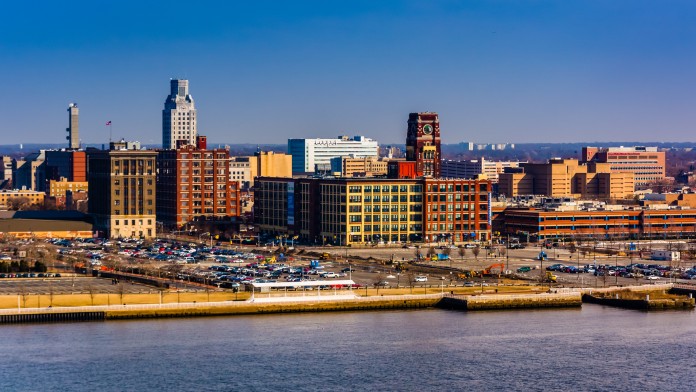Alcohol and Drug Use Statistics in Camden, NJ
The city of Camden, NJ, and Camden County have faced significant addiction and overdose problems in recent years. Some important facts about drug use in the region include:4,5,6
There were 2,061 emergency room visits for non-fatal drug overdoses in Camden County in 2021.
Of the total number of overdose emergency room visits in 2021, 846 were for non-fatal opioid overdoses.
Levels of Substance Abuse Care
Multiple levels of care are available for addiction treatment. Some New Jersey residents move through each of these levels of treatment, while others need only the least intensive care.
Alcohol and Drug Detoxification
Detox is completed under medical supervision in a hospital, inpatient, or outpatient setting. This is the process of safely and comfortably removing drugs or alcohol from your system. Once detox is complete, you can move forward with other treatment services.
Inpatient Drug and Alcohol Rehab
Inpatient rehab, also called residential treatment, involves living at a treatment facility to receive 24/7 care. Services usually include individual and group therapy, medication, recreational therapy, and nutritional counseling.
Partial hospitalization programs (PHPs)
PHPs allow New Jersey residents to live at home while receiving treatment through a hospital. This program usually provides the same treatment services as inpatient care, but you can return home during non-treatment hours.
Intensive Outpatient Programs (IOPs)
IOPs are a step down from PHPs, allowing you to attend a few hours of counseling each week while living at home. This provides time to maintain a work schedule or fulfill other obligations.
Standard Outpatient
Standard outpatient programs involve just one to two hours of treatment per week. This level of treatment involves the least supervision and is appropriate for highly motivated people who have a strong support system.
Aftercare
Also known as relapse prevention, aftercare starts once your rehab program is complete. It includes ongoing support such as 12-step programs, sober living homes, and therapy.
How to Pay for Drug Rehab in Camden, New Jersey
New Jersey Medicare
New Jersey Medicare provides health insurance to New Jersey residents who are 65 or older or have certain other health conditions. You are automatically enrolled in this program at age 65 if you are receiving Social Security or Railroad Retirement Board retirement benefits.
Many Medicare options are available in New Jersey that go beyond basic coverage, such as Medicare Advantage Plans and Medigap plans. The New Jersey State Health Insurance Assistance Program (SHIP) offers free help with questions regarding Medicare benefits and policies. Not all treatment centers accept Medicare insurance coverage, so always do your research before choosing a provider.
New Jersey Medicaid
New Jersey’s Medicaid program provides health insurance to New Jersey residents who are aged, blind, or disabled, to pregnant women, and to parents/caretakers and dependent children. To be eligible for New Jersey Medicaid, a person must be a resident of New Jersey, be a U.S. Citizen or qualified alien, and meet specific standards for financial income. You must apply for Medicaid coverage in New Jersey, and the rehab program must accept Medicaid as a method of payment.
Sliding Scale Rehabs
Sliding scale rehabs assist New Jersey residents who have limited financial resources to pay for treatment. You will be charged based on what you can reasonably afford to pay. To qualify for a sliding scale rehab in New Jersey, you typically need to provide proof of income.
TRICARE in New Jersey
New Jersey TRICARE (East region) is a government program that provides health insurance coverage for U.S. military personnel, veterans, and their families. TRICARE covers addiction treatment services; however, various plans differ in their coverage.
IHS-Funded Drug Rehabs
The Indian Health Service (HIS) funds addiction treatment for Indigenous people and Alaskan Natives in New Jersey and nationwide. This coverage is provided even if other insurance payment is available.
What You Need to Know About Camden, NJ
 Here are some important travel considerations if you are considering getting treatment at a Camden, NJ, rehab or if you are visiting a loved one there:
Here are some important travel considerations if you are considering getting treatment at a Camden, NJ, rehab or if you are visiting a loved one there:
- Camden, NJ, is directly across the Delaware River from Philadelphia, PA. The Walt Whitman Bridge connects the two cities.
- The closest airport to Camden is the Philadelphia International Airport.
- There are Amtrak stations in Philadelphia and Cherry Hill, NJ.
- You can reach Camden, NJ, by car via Interstate 76 or U.S. Route 130.
- There is a bus service in parts of Camden.. You can also use ride-share services to get around town.
- There are dozens of hotels in and around Camden and across the river in Philadelphia. Hotels range from luxury brands like the Four Seasons to more affordable chains such as Marriott or Hilton.
- Both Camden and Philadelphia have a wide variety of dining options. There are national chain restaurants as well as small eateries serving local specialties.
- Visitors to the area can visit the Adventure Aquarium and explore the waterfront area of Camden, NJ. Across the river, visitors will find the Philadelphia Museum of Art, the Barnes Foundation, and the Franklin Institute. Philadelphia is home to major league sports teams as well as venues for live music, theatre, and dance performances.
New Jersey Drug and Alcohol Laws
New Jersey policy makers have established the following laws related to substance misuse1,2,3,4,5
New Jersey Good Samaritan Law: New Jersey’s Overdose Prevention Act provides protection from criminal prosecution for New Jersey residents who report or seek help for suspected overdose on illegal drugs. The law encourages people to call 911 immediately, without fear of legal repercussions.
New Jersey Driving or Operating Under the Influence Laws: Under New Jersey Law, if an offender’s blood alcohol content (BAC) is between 0.08 and 0.10, the penalties are a fine of $250-$400, imprisonment for up to 30 days, driver’s license forfeiture until ignition interlock is installed (required for 3 months), a minimum of six hours a day for two days in an Intoxicated Driver Resource Center, and an automobile insurance surcharge of $1,000 per year for three years. Penalties increase for higher BACs and repeated offenses.
New Jersey Naloxone Blank Standing Orders: This law allows adults 21 years or older to use, purchase, and carry cannabis. Recreational users can purchase up to 1 ounce of cannabis, but the law does not permit personal growing of the plant.
New Jersey Drug Courts: This program offers non-violent drug offenders an alternative to prison. New Jersey residents convicted of a drug-related crime may be eligible to complete a supervised drug or alcohol treatment program instead of serving jail time.
Resources
- Office of the Chief State Medical Examiner, (no date), Dashboard – Confirmed Drug Deaths.
- State of New Jersey. (July 2, 2021). Governor Murphy Signs Legislative Package to Address New Jersey’s Opioid Epidemic.
- State of New Jersey Department of Health. (January 18, 2022). Governor Murphy Signs Legislative Package to Expand Harm Reduction Efforts, Further Commitment to End New Jersey’s Opioid Epidemic.
- N.J. Cares, (no date), Suspected Drug Related Deaths, Naloxone Administrations and PMP Data By County.
- New Jersey Department of Health, (no date), Substance Use Treatment.
- New Jersey Department of Heath, (no date), Drug-related Hospital Visits.



